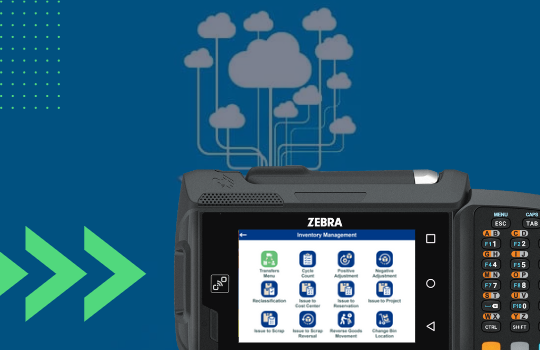Mastering Mobile Inventory Management for Oracle SCM Cloud: The Ultimate Guide
- ERP Systems
- Oracle SCM Cloud
OVERVIEW:
- Overview of Mobile Inventory Solutions
- What Problems Does Mobile Inventory Solve?
- Benefits of Mobile Inventory for Oracle Cloud SCM
- The Role of Mobile Apps in Mobile Inventory
- Offline Inventory Control for Oracle Cloud SCM
- How to Preserve Legacy ERP Functionality
- Industry-Specific Mobile Solutions
- Finding the Right Mobile Inventory Solution
- Future Trends and Innovations
- Mobile Inventory as a Best Practice
In today’s fast-paced supply chain, effective inventory management is crucial to success. With the growing reliance on digital technologies and reliable data, Oracle Fusion Cloud SCM has emerged as a powerful platform, enabling organizations to optimize their inventory control practices.
However, having the ERP in place doesn’t automatically equip your workers with critical inventory data. High-performing operations require instant, on-demand access when and where employees need it. The ability to update Oracle Cloud as work occurs is an essential best practice for accurate tracking and reporting.
That’s why companies running Oracle are increasingly turning to mobile solutions to maximize accuracy, efficiency, and the benefits of their ERP investment.
In this guide, we will explore mobile inventory solutions for Oracle Fusion Cloud SCM & Manufacturing, its uses, benefits, and best practices for evaluating possible solutions and vendors.

Overview of Mobile Inventory Solutions for Oracle Cloud SCM
While Oracle Cloud SCM is an innovative, next-gen ERP platform, getting maximum value from it requires mobile inventory management.
Mobile inventory solutions use a combination of mobile devices, barcode scanning, and software to automate manual processes.
One such solution is mobile barcoding, which extends the power of Oracle Fusion Cloud SCM to point-of-scan. Equipping frontline staff with mobile software gives them the ability to update Oracle Cloud in real time, wherever they work.
With the right mobile tools in place, you can create a truly mobile supply chain while driving critical KPIs like accuracy, efficiency, quality, and more. The end result is an agile, resilient supply chain operating at optimal performance.
Implementing mobile barcode software for Oracle Cloud SCM can enhance multiple areas of supply chain management, such as:
- Demand planning and forecasting
- Sales and operations planning
- Inventory management and optimization
- Supplier collaboration and performance management
- Manufacturing planning and execution
- Quality management
A variety of other advanced mobile solutions exist as well. Such solutions use mobile apps and backend process automation to further streamline operations. For instance, RFgen Mobile Edge™ uses both to enable quick and easy-to-configure automation for unique and complex business needs.

The Definitive Guide to Mobile Inventory Management Systems
READ NOW »What Problems Does Mobile Inventory Solve?
Companies looking into mobile solutions for inventory management are often seeking to solve a problem or set of problems. While mobile is not a cure-all, it can help alleviate bottlenecks, free up manpower, and automate otherwise laborious tasks with cost-effective solutions and fast ROI.
If any of these problems sound familiar, then mobile inventory could be a good fit for your operation:
- Inefficient inventory/warehouse processes
- Lack of visibility or reliable data
- Labor and cost challenges
- Lost or expired materials
- No offline inventory control

Garbage In, Garbage Out: How Small Errors Cause Big Problems in the Supply Chain
READ NOW »Benefits of Mobile Inventory for Oracle Cloud SCM
For operations to be nimble and efficient, a mobile supply chain is needed. By using widespread familiarity with mobile devices, you can put much-needed information in the hands of your workforce. Material handling becomes easier, faster, and more efficient.
Some of the immediate benefits of mobile inventory for Oracle Cloud SCM include:
- 24/7 visibility
- 99.9%+ accuracy
- +30% efficiency
- +30% productivity
- +80% faster training
An effective mobile inventory system also generates larger operational benefits, such as:
- Reduced operational costs
- Enhanced business alignment
- Elevated customer service
- Better demand planning and forecasting
- Streamlined order management and procurement
- High-quality data for reporting and decision-making
- Scalability of operations
The Role of Mobile Apps in Mobile Inventory
While mobile inventory solutions do most of their automation work in the background, warehouse workers will use mobile apps to interact with the software and your ERP.
Mobile apps give end-users a simple, intuitive interface that only shows them the forms and fields they need to do their job, increasing productivity. Combined with instant transactions with Oracle Cloud, inventory control accelerates into real-time with pinpoint accuracy.
Mobile Apps for Oracle SCM Cloud
For Oracle Cloud mobile apps, many options exist. However, not all are equal. Some solutions are general-purpose while others are sold off-the-shelf. General purpose apps often fail to sufficiently satisfy the nuances or complexities of the supply chain. As-is applications are similarly broad and difficult to mold to unique business processes.
Efficient inventory management requires mobile software architected specifically for the task.
RFgen Mobile Edge™ provides purpose-built mobile supply chain functionality on a flexible mobile framework that makes modifications and maintenance easy.
Pre-built mobile applications built on a mobile platform provide a template to facilitate fast, low-effort configuration. Instead of conforming your business practices to your software, you can mold your software to match your exact processes. Meanwhile, the pre-built component saves the cost and effort of coding each mobile application from scratch.
RFgen Mobile Edge™ for Oracle Cloud provides ready-made mobile apps for:
- Inventory Management: cycle counting, inquiries, issues, subinventories, physical inventories, and transfers.
- Order Management: picking, wave packing, sales orders, work orders, and ship confirm.
- Purchase Orders: receiving, line inquiries, inspections, put-away, returns, and RMA returns.
- Manufacturing: completes, OPM completes, issues, and OPM issues.
Additional apps for security, fixed assets, maintenance, and time tracking are also available.

3 Ways Mobile Barcoding for Oracle SCM Can Help Secure Remote Access
READ NOW »Native or Web-Based Mobile Apps?
Solutions like Oracle Cloud Order Management and other SCM tools can be extended with native mobile applications or web-based applications. Both have advantages.
Web-based mobile apps are simpler to deploy since the only compatibility requirement for mobile devices is the ability to use a web browser. Unfortunately, web apps can be slow to interact with Oracle Cloud (up to 50 seconds per transaction) and lack offline capabilities. Overall functionality is limited.
Native mobile apps enable maximum use of each device’s capabilities, including processing power, camera, GPS, and more. Transactions with your ERP are much faster. But native apps can be challenging since compatibility across different devices requires tweaking.
Solutions like RFgen give you the best of both worlds. The built-in Mobile Development Studio enables you to leverage the full potential of native apps without the compatibility headaches. Not only do you get transactions that update Oracle in just milliseconds, but automated scaling capabilities allow for cross-device compatibility, regardless of screen size or device type.
You also have several options for offline inventory control.

4 Ways RFgen Mobile Apps Help You Get More Out of Oracle SCM Cloud
READ NOW »How Mobile Apps Improve Worker Productivity
Mobile apps for Oracle SCM not only equip workers with on-demand access, but also can be designed to increase productivity by simplifying complex interactions with the ERP.
By default, entering transaction data into Oracle screens takes up a lot of time. To update the database, whoever is doing the data entry must cycle through multiple fields and screens, most of which don’t apply to the transaction.
A focused mobile UI/UX cuts out the excess forms. This way, end-users only interact with the fields they need to complete the transaction. Since mobile screens are far simpler, and use guided prompts, solutions like RFgen Mobile Edge™ greatly increase productivity, efficiency, and speed.
For example, completing a PO receipt may take up to 6 screens and 45 minutes. With a mobile app for PO receipts, the same transaction takes just seconds. Imagine being able to transact inventory 90-100 times faster! That’s the power of enterprise mobility.
Offline Inventory Control for Oracle Cloud SCM
A common gap in inventory management is offline control. When your mobile device doesn’t have access to Wi-Fi or Oracle is offline for maintenance, data collection stops. Materials stop moving.
Having an offline component becomes essential to ensure the continuous flow of goods without loss of productivity.
Offline inventory control solutions for Oracle Cloud can be part of your mobile environment. Equipping workers in the field or in specialized areas like freezers with offline data collection ensures 24/7 continuity. Data doesn’t get lost—and doesn’t need to be reworked—when connectivity drops.
Depending on the needs of your operation, one or more offline inventory solutions may be helpful:
- Batch Offline Solutions: Enables the device to store data until Wi-Fi or cellular connectivity is restored. Ideal for freezers and offsite tasks.
- Continuous Availability: A highly reliable offline inventory management solution that maintains data collection capabilities while connectivity with Oracle Cloud is unavailable. Very effective for mission-critical operations and at remote sites.
- Field Mobility: Similar to batch mode, field mobility also leverages additional capabilities for signature confirmation, GPS integration, and periodic connectivity with Oracle Cloud.
How to Preserve Legacy ERP Functionality
If you’re one of the many organizations that use multiple ERP platforms, then you may be worried about losing functionality when one of your legacy ERPs is retired. The same holds true for companies seeking to migrate to Oracle Fusion Cloud.
Unlike last-gen ERPs that were primarily on-premises, Oracle Cloud’s core code cannot be customized. Although beneficial in the long run, this could mean reconfiguring your business processes to match the way Oracle Cloud operates.
You may lose custom code or essential features for unique and complex business processes when leaving that old software behind.
Mobile inventory solutions like RFgen cater to this exact need. Highly adaptable and customizable, your Oracle Cloud mobile solution can be designed to preserve legacy functionality or augment current Oracle capabilities. Having the solution in place before pulling the plug will help prevent disruption.
With a decades-long history of mobile integrations, RFgen senior consultants are able to integrate multiple enterprise systems for two-way data exchange. Enterprise organizations running other major ERP platforms like Oracle E-Business Suite, Oracle’s JD Edwards, SAP, Microsoft Dynamics 365, and even Deltek Costpoint, can tie these disparate systems into a single holistic data ecosystem.
This approach empowers you to harness the full power of Oracle Cloud SCM without sacrificing existing capabilities.
Industry-Specific Mobile Inventory Solutions
Mobile inventory covers material handling of all types. Therefore, any industry that handles large amounts of inventory or fixed assets can benefit from mobility. Wherever your operation needs to track or transact inventory, Oracle-connected mobile apps can make it happen.
Mobile Solutions for Manufacturing
In particular, manufacturers have much to gain from mobile inventory solutions. Real-time tracking of raw materials, WIP products, finished goods, fixed assets, spare parts and consumables, and other types of materials helps reduce shrinkage and increase efficiency.
Fewer stoppages on the production line due to insufficient inputs translate to lower overhead and greater profits.
With mobile, you can enhance production for discrete, process, and mixed-mode manufacturing. Track materials across production flows using lot, batch, and serial numbering, as well as license plating (advanced pallet labels).
Other industries that make or process goods stand to benefit as well:
- Aerospace & Defense
- Automotive
- Chemicals
- Consumer Packaged Goods (CPG)
- Electronics
- Food & Beverage
- Industrial Manufacturing
- Medical Devices
- Oil & Gas (and companies supporting the industry)
To name a few.
Mobile Solutions for Distributors
Distributors and wholesalers need speed and accuracy to ensure orders go out the door on time—and they don’t come back. For distribution centers using Oracle Cloud SCM, mobile inventory is an essential component of efficient operations, from retail to wholesale.
Mobile apps greatly accelerate pick/pack/ship as well as their accuracy. RMAs become simple, fast, and efficient.
Mobile Solutions for Other Industries
If your business handles large quantities of equipment at multiple locations or campuses, mobile inventory can help you track fixed assets more effectively.
RFgen mobile barcoding solutions for Oracle have delivered proven benefits to companies in:
- Hospitals
- Mining
- Municipal governments
- University and corporate campuses
- Utilities
Case Studies: Real-World Successes for Oracle Cloud SCM
We’ve explored the impact of mobile inventory management solutions for Oracle Cloud SCM. Next, let’s take a look at firsthand experiences of several organizations. These real-world success stories offer telling case studies for the transformative effects of mobile software.
Boyd Corp Migrates to Cloud, Preserves Legacy Processes
Boyd Corporation, a global pioneer in thermal management solutions, faced a complex challenge. Multiple facilities using different on-premise ERP systems made oversight increasingly difficult. The company decided to unify its enterprise data with an upgrade to a single instance or Oracle Cloud SCM while enhancing existing processes.
The company’s internal Oracle resource recommended RFgen’s mobile solution. RFgen provides seamless, certified integration with Oracle SCM Cloud and Boyd’s main legacy ERP system, E-Business Suite.
Crucial to the decision was the fact that RFgen’s flexibility enabled Boyd Corp to keep custom workflows built for EBS after migrating to Oracle Cloud’s standardized platform.
In addition, the company enjoyed multiple benefits in its supply chain:
- Real-time inventory management for receipts, manufacturing, and shipping
- Enhanced shop floor continuity, augmenting Oracle Fusion Cloud SCM
- Barcode label generation and on-demand printing to support labeling compliance
- In-house solution governance with low-code developer tools
Among many more. With the initial flawless implementation completed, Boyd quickly made plans to roll out RFgen to additional facilities in the near future.

Boyd Corporation Preserves Crucial Custom Processes with RFgen
READ THE FULL STORY »Sunopta Gets Agile, Boosts Inventory Visibility
Innovative plant-based food manufacturer SunOpta Incorporated needed a mobile barcoding solution that can operate effortlessly within a multi-ERP environment. Since many providers of mobile solutions can only integrate with one ERP, this proved a challenge.
To their delight, SunOpta discovered RFgen mobile barcoding. By leveraging automation through barcode scanning, SunOpta enabled pinpoint inventory accuracy, high levels of efficiency, and granular food and ingredient traceability—all without sacrificing quality.
RFgen barcode software includes a built-in developer module called RFgen Mobile Development Studio. This low-code tool development tool empowered SunOpta to modify, maintain, and create applications for their mobile solution without outside help. The Mobile Development Studio helped SunOpta further maximize its ERP investment and achieve fast ROI.
Read the full story here.
Finding the Right Mobile Inventory Solution
Once you have gained a firm understanding of your internal business needs, the next step is to find the right mobile solution for Oracle Cloud SCM.
Consider some of the following criteria:
- Integration: Does the mobile solution have certified integration with Oracle Cloud?
- Functionality: Will the solution expand operational capabilities?
- Flexibility: Can the software be configured to your specific business processes?
- Usability: Is the mobile UI/UX simple and intuitive for end-users?
- Offline: Does the potential solution include seamless offline inventory control?
- Self-Ownership: Is there an option to manage or configure the solution in-house with low-code?
- Implementation: How long will it take to reach go-live and will you have support along the way?
Look for Experienced Experts
Beyond the software itself, you will want to look for a vendor that can provide nuanced, expert guidance during the buying, implementation, and post-implementation processes. Some providers may use junior consultants that lack adequate experience to help you solve your problems satisfactorily. Opt for a company that can offer experience and best practices to get the best possible outcome.
Consider Managed Services
Some companies may wish to offload as much technical maintenance burden as possible, especially when IT bandwidth is limited. In this case, ask potential vendors if they offer managed services. Although there is an additional expense, managed mobile services remove the worry and resources that would otherwise be required to manage the solution with in-house personnel.
Explore mobile inventory success stories.
READ NOW »Future Trends and Innovations in Oracle Cloud SCM
As mobile technology continues to advance and Oracle Cloud SCM gains more functionality, we can expect continuing value from both. Investing in mobile solutions for Oracle Cloud will be one way to future-proof your ERP ecosystem. This is especially true for mobile platforms that can be easily expanded or modified with built-in low-code tools.
Expect new innovations in emerging technologies like the Internet of Things (IoT), the Industrial Internet of Things (IIoT), artificial intelligence (AI), augmented reality (AR), and robotics as well. Integrating these high-potential technologies into automatic data collection software will further enhance supply chain operations.
Regardless of which solutions you bring into your warehouse or production plant, barcoding remains a mainstay for inventory management. Without perfect data collection, accurate reporting is impossible, leading your organization to less-than-optimal decision-making. The future of your business could be at stake.
Mobile Inventory is a Best Practice for Oracle Cloud SCM
Companies using Oracle Cloud SCM already enjoy digital operations. Mobile inventory solutions allow businesses to leverage mobile barcode scanning and real-time inventory tracking to make informed decisions, reduce costs, and improve overall efficiency.
Equipping frontline workers with mobile devices and barcode scanners isn’t optional in the modern supply chain. It’s a necessary but beneficial value-add proven to provide upticks in key performance metrics.
Making Oracle Cloud SCM mobile provides a powerful, flexible means for optimizing supply chain processes and addressing unique challenges faced by each industry. Without it, Oracle Cloud users are bound to struggle with inefficiency and unreliable data.
Stop wasting time and resources when mobile inventory can help you elevate agility and profitability, while ensuring scalability for long-term growth.




